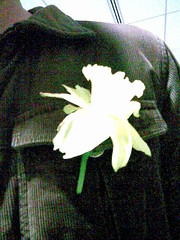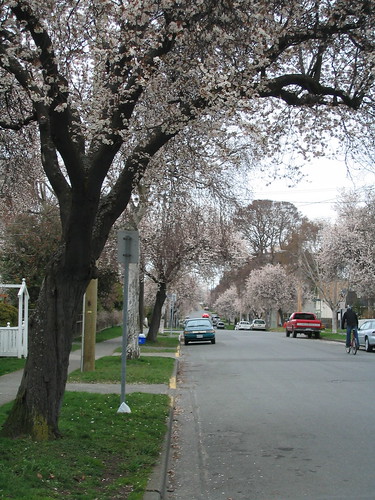13 Apr 2009
 Leaving the house this evening, my daughter presented me with a daffodil from the garden, and I put it into my lapel. Little did I know that this would cause me to be sent through the “special line” at customs: the daffodil is an agricultural product.
Leaving the house this evening, my daughter presented me with a daffodil from the garden, and I put it into my lapel. Little did I know that this would cause me to be sent through the “special line” at customs: the daffodil is an agricultural product.
On the up-side the officers were uniformly good humored and enjoyable and basically waved me through (who can be cross with a man with a daffodil from his daughter?) so it was actually a positive in an otherwise normal drab transit of SeaTac.
07 Apr 2009
Remember when “coverage” was the holy grail? “Boy, if I could just read/write coverage, I could interoperate with the GIS folks no problem.”
And then things seemed to get better. Most data was in “shape files” and there was a published specification which more-or-less matched the data generated by the ESRI tools. And lots of folks were using ArcView, so you could share “avl” files (layer style) and “apr” files (project file) and even write third-party tools to consume them directly (they were just a funny text format after all).
And now they are back-sliding. Layers and projects are “lyr” and “mxd” binary formats generated by ArcGIS and not consumable by third party tools. Data is starting to be moved into “file-based geodatabase” (FGDB) and the only tools that can peer into those are Arc*. (The old geodatabase had a lot of drawbacks, but at least you could open it in a third-party tool.) There are no specifications for the data formats, for the layer formats, for the project formats.
I thought we in the computer profession had this discussion and came to a consensus: vendors that tried to use proprietary file formats as a lock-in were to be avoided if possible and castigated if necessary. Even old Microsoft had to play the “open format” game, at least in mixed company.
It’s not just data, though the rise of the closed FGDB format over the last couple years is bad enough. The “metadata”, the style files and the project files, are a key piece of “operational data” that can be incorporated into workflows automatically – if you can read and write them. With format lock-in in place, the only way to automate your work flows is through the vendor-approved channel.
Really, I thought it was decided – they don’t get to do this to us anymore.
07 Apr 2009
Why do we get so uptight about rings that touch themselves? After all, masturbation is perfectly normal for a young ring. Healthy even.
07 Apr 2009
You know Spring has really returned to Victoria when the cherry blossoms come out. I can’t begin to say how happy I am not to live in a place where turkey vultures are the harbingers of Spring.

06 Apr 2009
Open source has some real problems in the market, and most of them seem to reside between the ears of the people making corporate decisions on software. Really good article on procurement perceptions here from a Plone support company (what, Plone needs support? :)
The bit that Simon said that made the bulb go on in my head? He said that most companies set out on a procurement process to procure a software license. That is what software is to them: licenses. That is what they know, and that is how they think. If you’ve ever had the fun of dealing with the contracts/procurement department of a large company you will recognise this thinking. And so with that goal in mind, of course they end up succeeding in their quest to procure a license for software
–Matt Hamilton
 Leaving the house this evening, my daughter presented me with a daffodil from the garden, and I put it into my lapel. Little did I know that this would cause me to be sent through the “special line” at customs: the daffodil is an agricultural product.
Leaving the house this evening, my daughter presented me with a daffodil from the garden, and I put it into my lapel. Little did I know that this would cause me to be sent through the “special line” at customs: the daffodil is an agricultural product.



